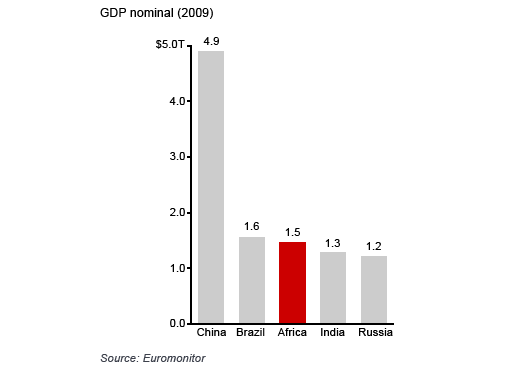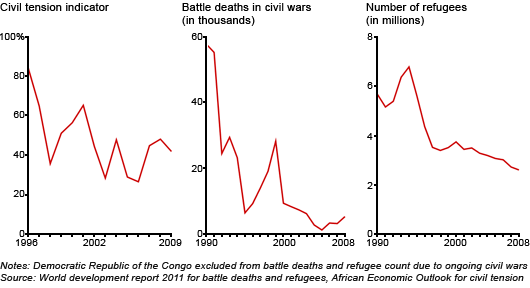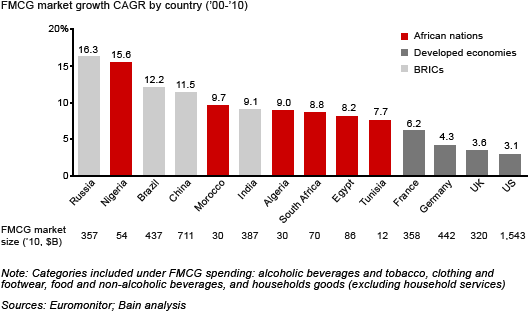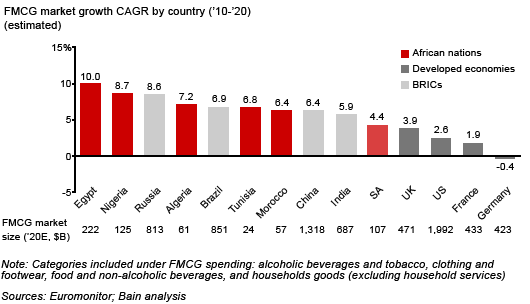Article


Vijay Vishwanath
If you're like many consumer products executives, the thought of pursuing growth in Africa seriously slows down when you consider the poverty, famine, political instability and risk—factors that would worry any business leader. But over the past decade, the continent has undergone a quiet—yet dramatic—evolution that makes it worthy of reconsideration (see charts below). It's time to take a new look at Africa.
Refreshing your views on Africa might lead you to do things quite differently, and maybe more radically, than you might typically expect.
To be serious about addressing the opportunities in Africa, you can't simply put it on your corporate agenda: You need to make it a higher priority than other opportunities and invest accordingly.
Take Diageo, for instance. The global spirits leader started exporting Guinness to Sierra Leone back in 1827, but it was not until the early 1960s that the company established its first major overseas brewery in Nigeria. Over the past six years, however, the beverage maker realized that Africa could become a significant growth engine, so it established the region as a top global priority—even recently elevating it to a standalone business that reports directly to Diageo's CEO. Diageo has invested in excess of £1 billion in Africa over that period, building local manufacturing capacity, acquiring local brands, setting up intricate route-to-market models and supporting its brands.
Few consumer products players have gone as far as Diageo in prioritizing Africa. And the results speak for themselves: The region represents Diageo's largest emerging market by sales and profit, experiencing double-digit growth and generating attractive profits. In fiscal year 2011, it contributed 30 percent of Diageo's global sales growth and 40 percent of its global operating profit increase. Seeing bright prospects, Diageo plans to further expand its business in Africa over the foreseeable future. (For more on Diageo's business in Africa, watch our video conversation with Nick Blazquez, president of Diageo Africa.)
Two Indian companies, Marico and Godrej Consumer Products, are pursuing opportunities in Africa in a relatively different way. The traditional playbook for a multinational consumer products company going into a new emerging market is to leverage its existing categories and brands as much as possible. Marico and Godrej decided to continue playing in the categories, such as hair care or personal care, that made them popular in India. But rather than pushing their own brands, which lack recognition outside of India, the companies chose inorganic growth, acquiring local African brands and developing them.
The experience of Marico and Godrej provides important lessons for other consumer products companies. First, growing in Africa requires a willingness to accept greater risk than growing elsewhere. Marico and Godrej chose not to utilize their strongest assets in Africa, but instead start with a blank sheet of paper.
Second, Africa calls for higher flexibility and responsiveness, particularly when it comes to M&As, where the game is becoming increasingly competitive. Marico and Godrej acquired companies that most Western multinationals would consider small and risky. Because they went on a deliberate hunt for target companies—and were in constant alert—they were able to act swiftly when the right prospect appeared.
Finally, the rise of players like Marico and Godrej shows that the playing field in Africa is not restricted to large multinational companies from the developed countries or to local players. Unlike China, India or Southeast Asia, Africa doesn't have many local incumbents with scale, and therefore Africa may well be the region where the new emerging market champions will grow to scale. This is yet another reason to put Africa higher on the corporate agenda—while there's still time.
Africa's GDP is already in line with most BRICs . . .

. . . and stability is improving

Africa's consumer goods market grew significantly in the last decade . . .

. . . and is set to grow at rates that will surpass even those of the BRICs
